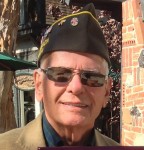
It seems that one of the major league baseball teams is giving away a baseball glove to every kid 14 and under who attends the opening season game. Now let’s not delude ourselves. No kid is going to win a fielding award with that glove. In fact, you’ll be lucky if it lasts a complete game. I mean it will be a flimsy, imitation leather held together with string stitching. But the promise, (hopefully for the ball club, anyway), should bring parents and their kids to the ballpark.
The thought of that glove brings to memory the first glove purchased for me by my dear father. He was one of those well meaning people who promised you the world. He relished and I guess needed the affection that emanated from us when he made those promises and somehow, after years of “non performance,” we continued to believe him (which maybe exemplified what a great salesman he could have been).
He had been promising my brother, Stanley, and me that as soon as he could (which meant hitting a winner at Pimlico), he would buy us new baseball mitts. My brother was using a hand-me-down from one of his friends whose father had “delivered” as promised, while I had to resort to borrowing a glove from an opposing team when they came up to bat and my side went on the field.
That I would soon have one that would enable me to catch grounders and flies like my idols on the Senators (we lived in D.C. then) had me fantasizing 24 hours a day. Imagine covering the infield like third baseman Buddy Lewis or even the great shortstop Cecil Travis (who, if he had played with the Yankees for the all of those years and not the lowly Senators, might have beaten out Phil Rizzuto for the position) or going back and, leaping in the air, nabbing a ball like swift centerfielder George Case, the great base stealer. Maybe in time I’d be as good as Frank Crosetti or Red Rolfe or even my idol of idols, Joe Dimaggio. They were Yankees, of course, but I loved them as much if not more than the Senators.
I used to sit in front of that static-filled, old Philco and listen to games whenever I could. The announcer then, Arch McDonald, was one of the most popular people in town. FDR was king of the nation’s capitol but Arch and Arthur Godfrey “owned” local D.C. radio in those years.
This, of course, was before TV and, as a matter of fact, before announcers went on the road with the clubs. When there was an out of town game, Arch would sit in the steaming studio (often in his under shorts) and read a ticker tape describing the “action”. He used a novel instrument to dramatize the games. If a batter got a hit, Arch would tap a bell, the number of taps or rings indicating the number of bases. Thus, a single would be one ding, a double, two, etc. In those years, the Senators being near the bottom in the standings, that bell sometimes “dinged” incessantly.
“Ball 1, ball 2, ball 3”. ding, ding, ding, ding. “Dimaggio (or Williams or Foxx or Gehrig or Greenberg ) takes a mighty swing and there goes the ball over the fence for a home run.” We listened to games with a juxtaposition of hope and anticipated disaster and those Senators usually delivered on the latter.
But I loved the game dearly. Whenever and wherever I could, I played. Although only 9 or 10, I could field and throw well and, best of all, for a kid my size and age, could hit the ball a fair distance. I usually played with the teen-age boys.
My father would sometimes take me to a game at Griffith Stadium. Except for the home team’s losing, I don’t remember much about any of those outings. What I do remember, however, is that the park was almost empty and it was horribly hot as it can be in D.C. I also vividly recall the team’s owners, Clark and Mrs. Griffith, both attired in white — he in ducks and high collar shirt with bow tie, jacket and Panama hat and she in a lacy, high neck dress and wide brimmed straw – sitting in their open, private box, sipping ice water (which, incidentally, was hawked at the stadium).
Well, one Friday my father came home a little more ebullient than normally and announced that not only was he taking the family out to dinner to the local, as he called it, Chinks, but he was buying us new mitts as well. In retrospect, he must have come out ahead at some racetrack (He told my dear mother that he had gotten a little bonus).
So off we went. We had our “typical” Chinese dinner – the folks, chicken chow mein, and my brother and I, breaded veal cutlets with creamy, mashed potatoes. Needless to say the two of us finished quickly and impatiently waited while my parents ate at their leisurely pace. Quite obviously they did not see or feel the urgency of the moment. Ultimately dessert was devoured, that awful tea was drained and we left.
I sensed trouble as soon as we pulled into the parking spot. Even a baby faced kid knew that Pep Boys was for cars; not sporting goods. Feeling a sense of gloom and impending disappointment, I climbed out of the car and followed into the store. My father’s, “Where’s the gloves you have on sale?” got a finger pointing to the back of the store. Modern merchandising and shelf positioning were not as sophisticated then and the management did not want any confusion over what the more important merchandise was.
Maneuvering ourselves around primarily tires and various auto repair and replacement items, we worked our way to the barely lit rear of the store. There piled carelessly was a forlorn mound of various position mitts. My heart leaped as I searched through catchers’ and first basemen’s mitts seeking the fielder’s mitt that would carry me to greatness. I found it. It was sturdy but flexible, had a deep, rich, brown sheen, that glorious cowhide smell and fit my hand like it was made for it. This was it. I wanted and needed this mitt.
My brother found his also. My father inspected that mitt like he was an expert and, confirming that that was the one really wanted, asked “OK, how much are they?” A feeling of combined elation and foreboding again came over me. Don’t panic. Keep your fingers crossed, I thought, we’re almost there.
“Stanley’s is, let’s see, $3.99. That’s a little more than I planned on but since he’s playing with the Legion team, he’ll need that better glove. Now as for you Onnie (that’s me) let’s see, that glove is, oh boy, $2.75. I’m sorry, I just don’t have that much to spend.” (Remember it’s the middle ‘30s and we’re still deep in the Depression). “You’ll have to take something a little less expensive. How about this little number. It’ll do the job and it’s only 98 cents.”
I couldn’t believe it. Even back then 98 cents was not going to buy a respectable baseball glove. I could tell that it was a flimsy imitation, meant more as a toy than a tool for sports. The leather, if that is what it was, was paper-thin, there was little padding and the stitching looked very meager. I was shaken. I certainly would never be able to take a glove like that to any game. I’d be laughed right off the field. At the same time I sensed and knew that my father would not comprehend my refusing his generosity. I knew he wanted to do better for me but he just did not have it then. I guess his day at the track was not that successful. I took the glove and forced a thank you from my saddened lips.
I never used that glove. Like I said, no self-respecting, promising player like me could be identified with such inadequate equipment. I inherited the one my brother had been borrowing from his friend. Ultimately, the original ownership was forgotten and I kept it permanently. I cleaned and oiled and nursed and used it for many years until finally, after saving enough from odd jobs around the neighborhood, was able to buy a glove that fit my dreams and fantasies (and “professional” status).
In spite of that day’s disastrous results, I continued to believe in and depend on my father’s promises. While he seldom fulfilled them, there was great happiness in just the expectations. Who knew, maybe, just maybe, he was going to deliver the next time.
Arnold Silverman, commander of the Laguna Beach VFW Post 5868, served in the Korean War.




